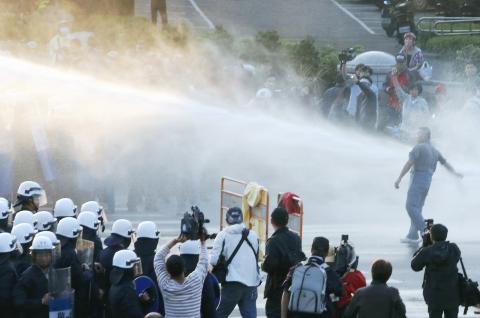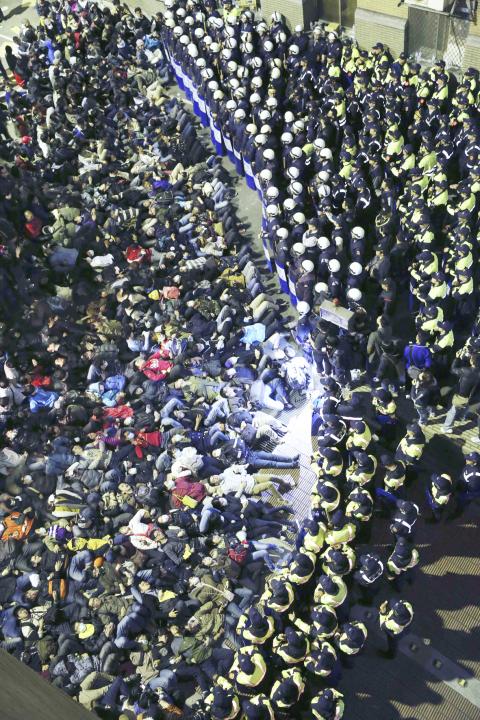At 5:45am yesterday, thousands of students protesting the cross-strait service trade agreement sat near the Executive Yuan complex on Zhongxiao E Road in Taipei “paying silent tribute to [the demise of our] democracy” and praying for the approximately 60 protesters injured when police forcibly ended their occupation of the Executive Yuan’s main building hours earlier.
The students said they “have no fear” of the possible repercussions their actions may have as they left the area to rejoin the protesters occupying the Legislative Yuan on the seventh day of the protest against the trade pact.
At 11pm on Sunday night, Premier Jiang Yi-huah (江宜樺) ordered the National Police Agency to evict the activists occupying the Executive Yuan before dawn. Jiang gave the order after speaking to President Ma Ying-jeou (馬英九) by telephone.

Photo: Reuters
After trying to pull, lift or drag protesters from the site, police employed two water cannon trucks, shields, batons and sticks to eventually remove all protesters from the Executive Yuan complex at 5:10am.
About 1,000 protesters remained outside on Zhongxiao E Road, while others gathered at the main entrance of the complex at the intersection of Zhongxiao E Road and Zhongshan S Road after 6am, prompting officers to turn the water cannons on them again. Not until after 7:15am were police able to reopen the roads to traffic.
The Executive Yuan said that at least 110 people were injured in the melee, including 52 police officers, while 61 people were arrested.

Photo: Reuters
At about 5:15am, several SWAT team officers approached Dennis Wei (魏揚) — a National Tsing Hua University graduate student and convener of the Black Island National Youth Front that masterminded the legislative siege — and handcuffed him because police believe he had instigated the storming of the Executive Yuan compound.
Wei had earlier said that confrontations with police at the Executive Yuan were to be expected, but “we [the protesters] are not deterred by that.”
“If we fear being forced out, we won’t be able to defend our democracy. We want to show the Ma administration the people’s determination,” he said.
The movement was sparked by the Ma administration’s perceived attempt to ram the pact through the legislature and follows months of calls by several sectors of society and public officials to renegotiate the deal or scrap it altogether.
Critics say the trade deal was negotiated illicitly without consulting the public, is skewed in China’s favor and puts Taiwan’s national security at risk, reasons cited by the protesters in their demands that the government suspend the pact and implement legislation to monitor future cross-strait dealmaking.
Less than an hour after hundreds of students forced their way into the Executive Yuan complex by throwing quilts over the razor wire around it, more than 2,000 activists gathered at the site, outnumbering the approximately 200-strong police force.
While more police were called in, the students set up audio equipment, moved in supplies from the legislature, hung up a giant banner, burst into some offices on the second floor of the main building and gathered at three main entrances and two other areas in the complex.
An hours-long standoff with police in all five places ensued, during which the students sat down arm-in-arm and shouted slogans as officers cleared people from Beiping E Road and assembled more riot police and SWAT officers there with two water-cannon trucks. The police force eventually numbered more than 3,000.
The protesters shouted at police to protect the people as the police drove a water cannon truck into the back door of the complex on Beiping E Road and forced some reporters from the scene.
At about 1:30am, the protesters lay down arm-in-arm to make their removal more difficult. Some with bleeding faces appeared to have been beaten up by police.
“I am really sad. My father is a police officer. Why are people in this country forced to attack each other? The police will kick you and beat you with batons,” said one man in tears who declined to be named.
A professor surnamed Fang (方) said police had kicked him in the chin, but that he “will go back, because my students are still there.”
Democratic Progressive Party (DPP) officials led by DPP Chairman Su Tseng-chang (蘇貞昌) urged police not to use force.
More people forced out of the complex were injured, including Taiwan Solidarity Union Legislator Chou Ni-an (周倪安) and a man suspected of suffering from epileptic seizures. They both lay on Beiping E Road for more than 10 minutes before being helped by medical personnel.
At about 4:20am, the police began to spray water at protesters gathering in the front square of the complex and at the entrance of the main building, and dragged some of them away. Scores of protesters lay down in front of the water cannon truck, and they were sprayed several times.
A man surnamed Chu (朱) said the police slapped him in the face when they pulled him out of the building.
“I didn’t resist the eviction. You wanted to lift me up from the ground, that’s fine, but why did you slap me?” Chu asked.
That night, ambulance sirens were heard often around the complex while medical volunteers rushed about to take care of emergencies.
“President Ma should take the biggest responsibility for the situation today, because he never listens to what people have to say. I didn’t think the Ma government should resolve any issue with the public by resorting to the use of police force. It will only create more resentment,” a man surnamed Kao said.
Meanwhile, saying that no violence should be used against students expressing their views on key national issues, the heads of the Greater Kaohsiung and Greater Tainan special municipalities — both governed by the DPP — yesterday said they are unwilling to offer further police backup to Taipei.
One-hundred-and-twenty officers who were sent from the two special municipalities to Taipei were recalled the previous week.
Additional reporting by CNA

Tropical Storm Gaemi strengthened into a typhoon at 2pm yesterday, and could make landfall in Yilan County tomorrow, the Central Weather Administration (CWA) said yesterday. The agency was scheduled to issue a sea warning at 11:30pm yesterday, and could issue a land warning later today. Gaemi was moving north-northwest at 4kph, carrying maximum sustained winds near its center of up to 118.8kph and gusts of 154.8kph. The circumference is forecast to reach eastern Taiwan tomorrow morning, with the center making landfall in Yilan County later that night before departing from the north coast, CWA weather forecaster Kuan Shin-ping (官欣平) said yesterday. Uncertainty remains and

SEA WARNING LIKELY: The storm, named Gaemi, could become a moderate typhoon on Wednesday or Thursday, with the Taipei City Government preparing for flooding A tropical depression east of the Philippines developed into a tropical storm named Gaemi at 2pm yesterday, and was moving toward eastern Taiwan, the Central Weather Administration (CWA) said. Gaemi could begin to affect Taiwan proper on Tuesday, lasting until Friday, and could develop into a moderate typhoon on Wednesday or Thursday, it said. A sea warning for Gaemi could be issued as early as Tuesday morning, it added. Gaemi, the third tropical storm in the Pacific Ocean this typhoon season, is projected to begin moving northwest today, and be closest to Taiwan on Wednesday or Thursday, the agency said. Today, there would likely

DISRUPTIONS: The high-speed rail is to operate as normal, while several airlines either canceled flights or announced early departures or late arrivals Schools and offices in 15 cities and counties are to be closed today due to Typhoon Gaemi, local governments announced last night. The 15 are: Taipei, New Taipei City, Taoyuan, Tainan, Keelung, Hsinchu and Kaohsiung, as well as Yilan, Hualien, Hsinchu, Miaoli, Chiayi, Pingtung, Penghu and Lienchiang counties. People should brace for torrential rainfall brought by the storm, with its center forecast to make landfall on the east coast between tonight and tomorrow morning, the Central Weather Administration (CWA) said. The agency issued a sea warning for the typhoon at 11:30pm on Monday, followed by a land warning at 11:30am yesterday. As of

CASUALTY: A 70-year-old woman was killed by a falling tree in Kaohsiung as the premier warned all government agencies to remain on high alert for the next 24 hours Schools and offices nationwide are to be closed for a second day today as Typhoon Gaemi crosses over the nation, bringing torrential rain and whipping winds. Gaemi was forecast to make landfall late last night. From Tuesday night, its outer band brought substantial rainfall and strong winds to the nation. As of 6:15pm last night, the typhoon’s center was 20km southeast of Hualien County, Central Weather Administration (CWA) data showed. It was moving at 19kph and had a radius of 250km. As of 3pm yesterday, one woman had died, while 58 people were injured, the Central Emergency Operation Center said. The 70-year-old